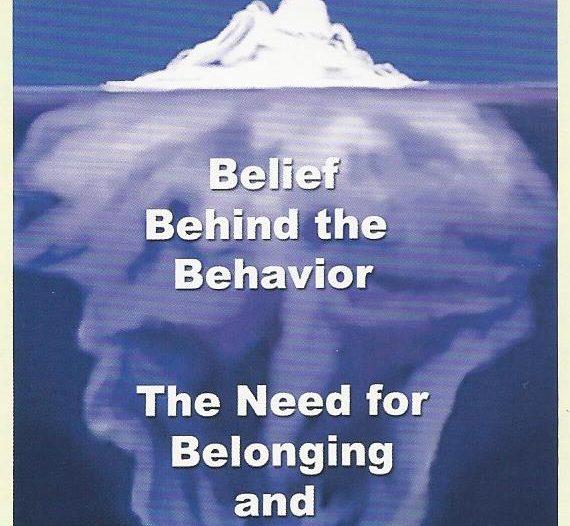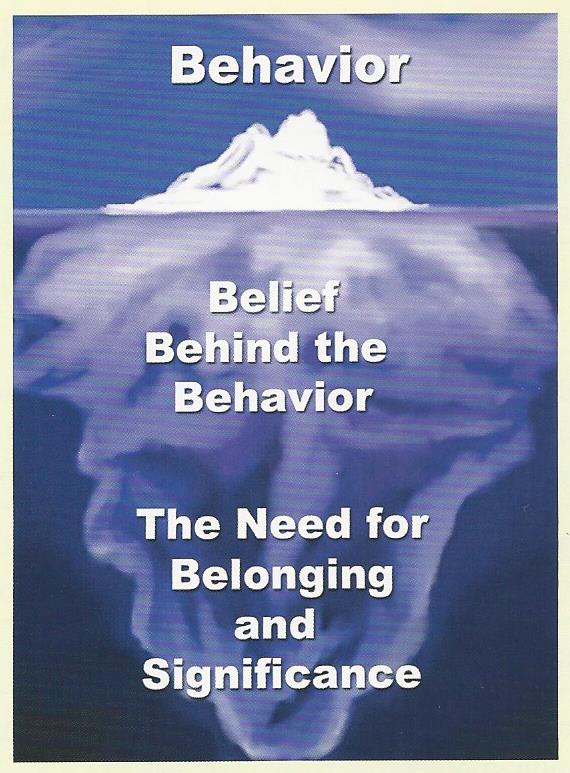
If you know anything about an iceberg, then you know the part that you see above the water is just a small fraction of it.
The majority of the iceberg is underwater.
Hence the saying, the tip of the iceberg.
This is especially true with your kids.
If they are demonstrating a certain behavior that is frustrating the living sh*t out of you, the behavior is just the tip of the iceberg.
The cause of the behavior, and the reason why they are demonstrating this behavior is the big part of the iceberg under the water.
So you can punish your kid for the behavior.
You can send your kid to time out and ground him and take away the phone and then take away everything.
When the punishment doesn’t stop the behavior, you can come up with something even harsher. And harsher. And harsher.
Or you can bribe your kid. You can use toys and candy and special outings and money to get your kid to stop. Or to start. Whatever it is you are hoping they will stop or start doing.
These things may work in the short run. It may stop the behavior immediately.
But inevitably, the behavior returns. Sometimes worse than before.
Like a virus.
It’s now a superbehavior, and it pushes you way over the edge. It pushes every single one of your buttons.
This image is from Jane Nelson’s Positive Discipline:

At the very root of any behavior is a child’s desire to belong and feel significant.
When they don’t feel like they belong, when they don’t feel significant, they start to believe certain things about themselves.
The develop mistaken beliefs.
So they start exhibiting all those challenging behaviors that push us over the edge.
When your kids talk back, when they are defiant, when they give up, when they retaliate, when break stuff, when they beat the crap out of their siblings, when they do all the things that drive us batshit crazy over and over and over and over again, even though it may seem like it, they are not doing all that stuff to be jerks.
They are doing it because they have a mistaken goal.
Their goal is attention, revenge, power, or the desire to give up and be left alone.
And our kids have these goals not because they want to drive us insane, but because underneath the water, where most of the iceberg is, they feel like they only matter when they are getting all your attention, no matter how they get it. Or they only feel like they belong when they have control. Or they don’t feel loved so they lash out and hurt people and destroy things. Or they feel like they’ll never get it right and they’ll never belong, so they just stop trying altogether.
I know we want the behavior to be about the kids just being spoiled or ungrateful or entitled brats.
But it’s not.
It’s about how we are reacting to situations and behaviors.
Just like us, our kids are never going to be perfect. Kids test things and push buttons.
But if we can react to situations and behaviors in a different way, we can start dealing with the part of the iceberg that’s below the surface of the water, rather than just constantly addressing the small percentage that we can see above the water.
There is a lot to address with each of these mistaken beliefs.
This behavior behind a power struggle can make us feel challenged, threatened, defeated and determined.
Determined to break our kid until he or she gets it.
And so we most often react by doing one of four things.
1) We fight back. This just intensifies the power struggle.
2) We give in. This make us doormats and our kids now know they can take advantage of us if they are persistent enough.
3) We say to ourselves, I’ll make you. More power struggles ensue.
4) We engage in getting to be right wars. Again, the power struggle gets more intense.
We may dominate in the short run. But the behavior will return.
And what we are doing in essence is rather than catching an arsonist, we are repeatedly putting out fires.
We aren’t looking for what is causing the fires.
We’re just dealing with them once they occur.
So what can we do differently?
We can respond in a different way.
And we can think about the message our kids are really trying to give us.
Although it may feel this way, when your kids defy you, they aren’t necessarily saying Go f*ck yourself.
There is a really good chance they are trying to say to you, Let me help and Give me choices.
Rather than fighting back or giving in or not stopping until our kids get it and we make them, we can do something else that will not only help to put out the fires, but to also change our kids’ mistaken beliefs about what they need to do in order to feel a sense of belonging and importance.
The next time you find yourself heading into a power struggle, consider trying some of these strategies instead:
- Put yourself in a time out. Take yourself out of the conflict. Give yourself time to calm down.
- Acknowledge that you can’t make your kid do something, and instead, ask for help. I can’t make you unload the dishwasher, but I would really appreciate your help.
- Be kind AND firm.
- Validate feelings. I know you want to eat ice cream, AND we are not having dessert tonight.
- Show understanding. I can totally understand not wanting to put your clothes away, AND it needs to be done before you watch television.
- Make agreements in advance. I know you don’t want to fold your laundry, AND what was our agreement?
- Redirect! You don’t want to take a bath AND let’s do it together. Want to race to the bathroom?
- Allow them to make a choice and then decide what you will do and follow through. I know you want to keep playing Minecraft on the iPad AND you’ve had your five minute warning and time is up. You can turn it off now, or it will be put in my closet until next weekend when you can try again.
- Offer a limited choice. Do you want to brush your teeth before you put your pajamas on, or after? You decide.
- Let routines (rather than you) be the boss. If you have a routine chart, this is when you ask them, What is the next thing on your routine chart you need to do when you get home from school?
- Get help from your child. Ask him/her what would be reasonable in this situation? What are reasonable limits? How much time do you think you will need to get ready for bed? What do you think is reasonable? What time should we start the routine so you can be in bed by 8:00? When your child is involved in determining how much time he/she needs, he will feel like he is a part of the process.
These are just some of the things you can try to get to the root of the problem, rather than repeatedly (and unsuccessfully) dealing with just the tip of the iceberg.
Just like anything, a change in your approach will take being mindful of how you are reacting to situations and then it will take practice.
But the more you practice, the more automatic your new reactions will become.
And once your reactions change, so will your children’s behavior.

very insightful. thanks for a good read